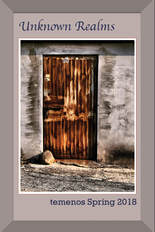Jeffrey Tucker - "Lecture, Early Spring" and "Somewhere in Transit"
Both of my poems appearing here ("Lecture, Early Spring" and "Somewhere in Transit") address the concept of alienation. "Somewhere in Transit" was inspired by a recurring nightmare (if it can be called a nightmare, since I am not asleep when it happens): I awake, disconnected from my memory and physical surroundings, and I do not recognize the woman—my wife, to whom I've been married for fourteen years—sleeping next to me. In these moments, it takes several frantic minutes for my memory to return. The oddity of this (aside from obvious, that is), is that, when I lived in the Deep South, I would run down the Longleaf Trace (a former Native American highway, now turned into a path for runners and cyclists) and feel a greater connection to the landscape—pines, deer, wisteria—than I would to my wife in those early-morning minutes of dissociation. The repeated (and repeating, as the nightmares continue) shock led to the poem’s creation.
“Lecture, Early Spring” was also inspired by alienation—in this case, alienation from my own physiology. My wife and I cannot have children; for many years, we did not know why. Though medicine has come a long way in the treatment of infertility, many mysteries remain. (Indeed, my wife and I only recently discovered the cause for our infertility last year, after over a decade of investigation.) It is a unique cognitive dissonance, knowing that one’s body works well except for something so basic—animalistic, even. And, yet, many people define a large part of their humanity by their exercise of that animalistic part of them. I still think about it.
“Lecture, Early Spring” was also inspired by alienation—in this case, alienation from my own physiology. My wife and I cannot have children; for many years, we did not know why. Though medicine has come a long way in the treatment of infertility, many mysteries remain. (Indeed, my wife and I only recently discovered the cause for our infertility last year, after over a decade of investigation.) It is a unique cognitive dissonance, knowing that one’s body works well except for something so basic—animalistic, even. And, yet, many people define a large part of their humanity by their exercise of that animalistic part of them. I still think about it.
|
Jeffrey Tucker teaches creative writing at Brigham Young University in Provo, Utah. His first full-length collection of poetry, Kill February (Sage Hill, 2016), was the winner of Sage Hill Press' 2015 Powder Horn Prize; his poems have also appeared in The Cape Rock, RHINO, Poetry South, South Dakota Review, and elsewhere. He is currently working on a collection of ekphrastic poems.
|
